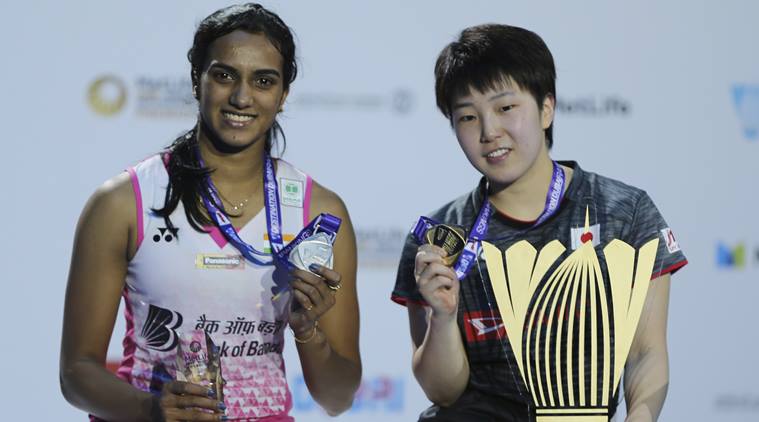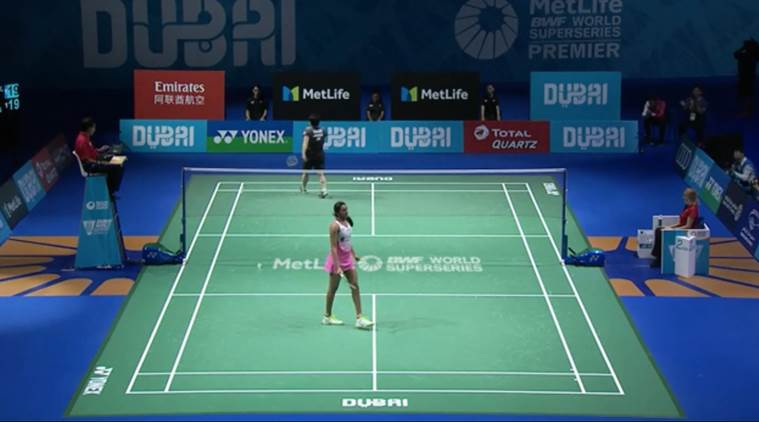Sports News
PV Sindhu finds silver lining in year of near misses at BWF World Super Series Finals
PV Sindhu failed to clinch big points in the BWF Superseries Finals title clash, falling to Japanese Yamaguchi’s tenacity and tactical nous

The Japanese hop around the court for the most part retrieving her swift, steep smashes, but PV Sindhu has ended up the final’s bunny a second time this year.
Twenty-year-old Akane Yamaguchi summoned all her tenacity and tactical nous to hand the Indian a finals’ defeat at the hands of a Japanese for the second time in five months. The 15-21, 21-12, 21-19 loss in 94 nerve-wracking minutes at Dubai’s Super Series Finals final won’t quite set alarm bells ringing — Sindhu’s still only 22 and with so much scope to improve. But she will step up efforts to improve her clutch-play technique, given that both the Japanese —Yamaguchi and Nozomi Okuhara at the Worlds —could freely play their natural games in closing out the two finals, while Sindhu couldn’t assert her style in clinching the big points when it mattered.
She would shrug it off saying, “It was fine,” and offer no excuse, but the Indian had struggled the whole week with a cold that left her breathless in the second set, even after she held a 21-15, 5-0 advantage and looked well on her way to finish this nearly-there 2017 with a big title.
It is now pretty evident that the way to beat the Japanese —both runners, but with vastly different repertoires of their kill-shots —is in short, snappy rallies, almost playing the men’s singles game of charge-and-kill at the net with precise hits and zero errors. It’s what fetched Sindhu the Olympic wins against ominous names like Tai Tzu Ying and Okuhara, as well as the career 5-2 advantage over Yamaguchi —10 inches shorter than her —going into Sunday’s final. But that demands a high level of speed and explosive power from Sindhu to nip the retrieves before rallies drag the Hyderabadi into a lull from where getting out becomes difficult. With a runny nose, and the ensuing woozy head that messes with clarity of thinking, she was in no position to keep a high-intensity game scrunched into short points.
Plan B is staying in the longer rallies with the Japanese, and drawing out errors, which Sindhu did for the most part, making the agile Yamaguchi chase down the bird for some heart-stopping exchanges. But like the 73-point rally in Glasgow, Sindhu’s perseverance through the long back-and-forths (she won myriad rallies of 33, 41, 40, 31 and 51 shots), though spectacular to watch and gasp at, were depleting her of oxygen in the lungs.
There’s little to be done when Yamaguchi kept picking every shuttle and simply took off with five-point surges in Game 2, and Sindhu staved her off leading till 14 in the decider. But this was a familiar Japanese ploy to relentlessly chip away at the Indian’s resolve even while they turned attrition into an art.
Counter
The Japanese deception is not in the wrist, but in the legs. Sure Sindhu, ranked 3 in the world currently, was catching Yamaguchi napping on shuttles sent to her far back, forehand corner (even while exploiting Sindhu’s forecourt lunge to the right with the cross drops), but the World No. 2 Japanese had trained hard to counter Sindhu’s height advantage.
“I could tell that Sindhu was getting a little bit slower but I had enough energy and had practised a lot for her. I’d trained on my speed to move a lot quickly because I knew my opponent was tall,” Yamaguchi said later.
The fleet-footed Japanese literally ran yards on her feet to negate Sindhu’s superior hitting span, even though Sindhu’s cross-court sliced drops from mid-court showed her to be better prepared than in Glasgow.
Exhaustion had crept in as a factor for both —at 13-13 in the decider, a long rally would end with Sindhu’s jabbing drive leaving Yamaguchi an inverted spread-eagle on her back on the floor. Every point conceded was like a choke start to draw from the last drops of fuel as the two stayed neck-to-neck, with manically summoned surges of pace and power.
 Japan’s Akane Yamaguchi, right, and India’s PV Sindhu pose with their medals after Yamaguchi won the final of the Dubai Badminton World Superseries Finals. (Source: AP)
Japan’s Akane Yamaguchi, right, and India’s PV Sindhu pose with their medals after Yamaguchi won the final of the Dubai Badminton World Superseries Finals. (Source: AP)
Sindhu had done well to stalk Yamaguchi to 19-all after handing her the lead at 15. It was at this juncture that all the ill-fated moments and poor judgments of the Glasgow Worlds jingled back like a bad penny.
First came the doomed low serve —otherwise a great attacking option, but here botched —with Yamaguchi thwacking it back at Sindhu’s body unsettling her. And then, the two errors into the net —the one at 20-19, a half-cooked backhand flick —were so reminiscent of the Worlds that the voodoo had déjà vu written all over it.
“I thought I would play a rally, but then it went into the net. It was just not my day,” Sindhu would say echoing a cold evening from August in Glasgow. All that could go wrong, did. And another Japanese emerged winner.
“That push into net at 19 (which gave Yamaguchi her match point) could have been the story of the match, so it was similar to the World Championships,” coach Pullela Gopichand would say later, adding, “But, she’s matured from the Worlds. She wasn’t mentally quite there in Glasgow. Here she was fighting much harder.”
No excuses
The coach maintained he was proud of her —given she wasn’t at 100 per cent. “I’m not going to feel very bad about it. She was out of breath in the second, and taking time to recover. With a nose block, you can’t think as clearly, and there’s no explosiveness. But overall, I’m happy, because whole season no one’s played as much as her.”
Her height is a double-edged sword. “She’s a big lanky player and there’s usually a tendency to let go off shuttles. But not her, she’ll stretch and bend and lunge and pick almost everything. I’m very proud of her,” he would say, moments after he was seen with an expressive face urging her to give it her all when the tide had started to turn. He’d even pray briefly, while his ward struggled to reach the finish line. The sands had shifted quicker than they do in the desert.
Earlier, the contest had taken off to the din of Indian expat fans who came wearing cricket jerseys from the 90s and armed with witty slogans.
Soon — and like happens with badminton matches involving Sindhu — screaming didn’t seem like the best thing to do as the battle swung titanically. Most hoped it wouldn’t go the Glasgow path, though that was exactly where it was headed, with another opponent with the same set of tenacious nerves, and springs for ligaments in her tibia-fibula foot-spokes.
Yamaguchi breathed badminton when she was as young as three —starting out in the sport following her elder brother in Fukui prefecture.

“Her first coach was probably her father,” says Haruo Shikaya, a seasoned journalist from Japan and Akane-chan, as she is fondly known, was the youngest to claim a women’s singles Super Series title when still at school. “When she won the Japan Open SS in 2013, she was more popular than Nozomi. But now I think it’s Nozomi because she won bronze at Olympics and gold at World championships. Now that Akane wins SS Finals title, maybe Akane will become more popular again,” Haruo states.
Refreshing
Japan’s emergence ahead of Tokyo hosting the 2020 Olympics has been a refreshing story, given its top players are maxing their fitness-based playing style, and aren’t particularly tall or powerful in conventional terms.
But Korean legend Park Joo Bong, Japan’s head coach, has pushed the singles players to play within their limitations, while sculpting all-rounded games. For all the individual glory coming Japan’s way in 2017 —replacing arch rivals China —it’s women’s singles crop has stayed adoringly mindful of the bigger picture. Yamaguchi lists winning the team championship Uber Cup as her career goal, and as such hit the headlines first as a 14-year-old, when she picked an inter-school meet over the World Championships soon after being crowned Junior World Champion (twice).
“That was her choice to participate in Inter high-school tournament rather than Worlds meet. Because that was her last year at high school and she really didn’t want to miss playing with her team mates,” Haruo recalls.
In Dubai, she was catching up with her peers (while denying the Indian a first SS Finals crown), and was always looking ominous the moment she downed former senior world champ, the immensely talented Ratchanok Intanon of Thailand.
Sindhu spiced up the final, but will have to wait until next year to corner global glory and snatch a gold.




